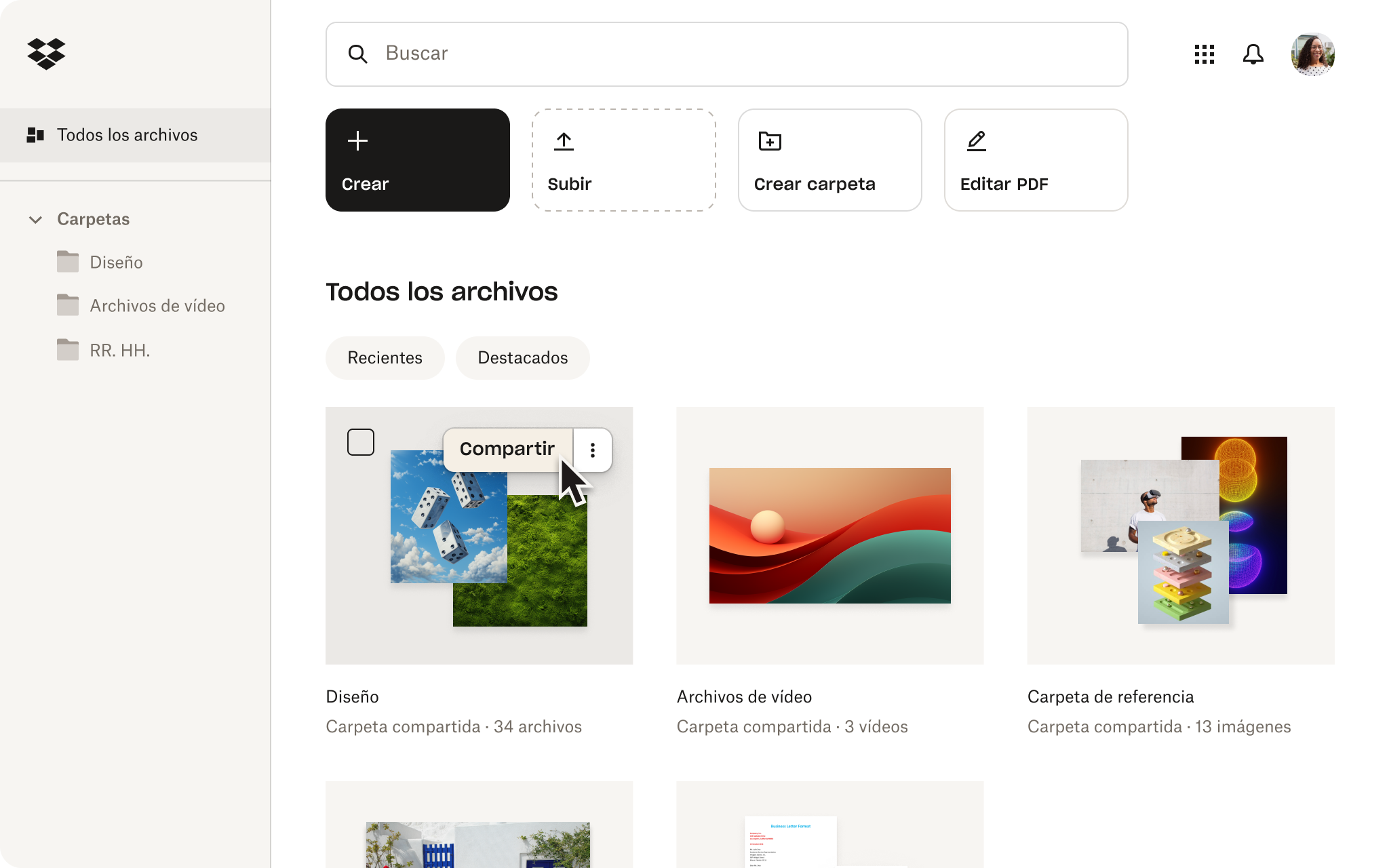Table of contents
- Significado y definición de VPN
- La función de una VPN
- Ventajas de las VPN: por qué la gente las elige
- Guía detallada del funcionamiento de una VPN
- Cómo configurar una VPN
- ¿Son las VPN seguras?
- Consideraciones clave al utilizar una VPN
- ¿Debería usar una VPN en mi empresa?
- ¿Cuáles son las desventajas de una VPN?
- Dropbox puede simplificar el acceso remoto como alternativa a las VPN
En la era digital actual, en que nuestra actividad online está constantemente expuesta a diversas amenazas y problemas de privacidad, asumir el control de nuestra seguridad en Internet es crucial. Conoce las redes privadas virtuales (VPN): una potente herramienta que permite a los usuarios navegar por la web de forma segura.
Significado y definición de VPN
Una VPN (siglas en inglés de red privada virtual), ofrece una conexión segura y cifrada a través de una red menos segura, como Internet. Esta tecnología permite a los usuarios remotos acceder a redes privadas de forma segura. Las VPN se han convertido en una solución popular para empresas con equipos remotos, pero ¿son la mejor opción para la colaboración y la seguridad?
Imagínate un túnel privado a través de la vasta extensión de la Internet pública. Este pasaje seguro protege tus datos de miradas indiscretas y garantiza la confidencialidad de tu actividad online. Una red privada virtual (VPN) crea este santuario digital, protegiendo tu información contra el acceso no autorizado y el uso indebido.
La función de una VPN
A las VPN se les atribuyen numerosas ventajas para usuarios que navegan por Internet desde casa y espacios laborales con altas cargas de trabajo. Entre ellas, destacan las siguientes:
Permite el acceso en remoto
Una VPN te permite crear una red privada en remoto de dispositivos seleccionados, lo cual resulta ideal para aquellos que teletrabajan. Esto te permite tanto a ti como a tu equipo seguir conectados (de forma segura), aunque estéis a miles de kilómetros de distancia o incluso en continentes diferentes.
Seguridad mejorada
Las redes wifi públicas, habituales en cafeterías o estaciones de tren, plantean riesgos de seguridad. Una VPN protege tus datos creando una conexión segura y cifrada. Esto significa que tu actividad online, como la navegación, el envío de correos electrónicos o las operaciones bancarias online, están protegidas contra interceptaciones, aunque se utilice una red wifi pública. Gracias a los métodos de cifrado avanzado, como AES (estándar de cifrado avanzado), tus datos resultan ilegibles para las personas no autorizadas.
Cómo evitar los bloqueadores de ubicación y las restricciones geográficas
Gracias a que la VPN oculta tu ubicación y te permite elegir un servidor en una región concreta, puedes ver el contenido desde cualquier lugar. Si estuvieras en China, por ejemplo, y quisieras acceder a tus cuentas de redes sociales, podrías encontrarte con que muchos de estos sitios están bloqueados. Sin embargo, al configurar tu VPN para ofrecer una IP basada en, pir ejemplo, Estados Unidos, tu Internet reflejaría tu conexión como si estuvieras en Estados Unidos.
Niega la ralentización
Aunque puede que esto no se aplique a todas las VPN y Proveedores de Servicios de Internet (ISP, por sus siglas en inglés), a veces un servicio de VPN puede ser muy útil para desviar restricciones de tráfico de la red. Por ejemplo, si tu ISP empieza a ralentizar tus datos tras rebasar cierto límite, una VPN puede ayudar a enmascarar tu actividad, lo cual permite que tu provisión de datos dure más. Dicho eso, en términos generales, usar una VPN puede ralentizar tu conexión de ancho de banda, ya que hay un paso adicional completo de reenrrutamiento de tu conexión a través de un servidor VPN. Sin embargo, esto suele ser generalmente un error que se da en anchos de banda domésticos y no en entornos profesionales.
¿Qué es una dirección IP?
Una dirección de Protocolo de Internet (IP) es un conjunto de números que se usan para identificar tu dispositivo cuando te conectas a Internet. Sirve como identificación y te ayuda a determinar tu ubicación. En algunos casos, esto puede ser una ventaja, por ejemplo si eres un pequeño negocio y necesitas que tu web y ubicación estén registrados de forma clara para tus clientes locales. Si tu equipo opta por una conexión VPN, pero sigues necesitando conservar tu dirección IP, hay VPN específicas para conseguirlo.
La razón principal por la que una VPN trata de esconder la dirección IP es porque esta puede delatar tu ubicación. Si, por ejemplo, un hacker consigue acceso a tu dirección IP, puede ver tu actividad en línea más reciente y potencialmente piratear tus cuentas. Pero esto no se limita únicamente a los hackers. ¿Te has preguntado alguna vez cómo los anuncios que ves en redes sociales parecen saber exactamente qué has estado buscando? Es porque tu ISP vende información sobre tu actividad en Internet. Una VPN evita que esto pase, ya que tu dirección IP está oculta.
Ventajas de las VPN: por qué la gente las elige

Uno de los atractivos de la VPN en el entorno laboral es el de conectar de forma segura a un equipo en remoto. Gracias a que ofrece más seguridad y accesibilidad, tu equipo puede trabajar de forma más eficiente.
- Actividad online segura: si utilizas una VPN, puedes confiar en que tus datos están seguros, incluso al compartir archivos.
- Protección de la privacidad: al enmascarar tu dirección IP, una VPN protege tu identidad online y evita que los ISP rastreen tus hábitos de navegación.
- Confianza para los clientes: antes de enviarte cualquier documento, tus clientes pueden esperar que tengas una VPN o un servicio igualmente seguro implementado.
- Red remota: una VPN permite que tu red interna se extienda más allá de la oficina y también permite que los equipos trabajen juntos de forma segura desde diferentes ubicaciones, lo que mejora la productividad y la flexibilidad.
- Desbloqueo de contenido: una VPN puede desbloquear contenido restringido en ciertas regiones, proporcionando acceso a información y servicios globales.
Guía detallada del funcionamiento de una VPN
1. Inicia la VPN y establece una conexión segura
Puedes obtener acceso a una VPN mediante un cliente o una aplicación de VPN. Esta conexión se conoce como "túnel VPN".
2. Cifrar el tráfico de Internet
Todo tu tráfico de Internet se cifra y se envía a través del túnel VPN. Este cifrado garantiza la privacidad y seguridad de tus datos.
3. El servidor VPN procesa el tráfico
El servidor VPN recibe el tráfico cifrado de tu dispositivo, lo descifra y lo envía a su destino previsto (por ejemplo, sitios web o servicios online). Esto garantiza la privacidad y seguridad de tu actividad online, aunque utilices una red wifi pública.
Con una VPN, puedes proteger eficazmente tu privacidad y seguridad online. Para empezar, la VPN cifra tu tráfico de Internet, evitando accesos no autorizados y escuchas clandestinas. Mejor aún, también te permite acceder de forma segura a sitios web y servicios desde cualquier parte del mundo.
Cómo configurar una VPN
Configurar una VPN es relativamente sencillo y normalmente se puede llevar a cabo en solo unos cuantos pasos:
- Elige un proveedor de servicios de VPN de confianza y suscríbete a su servicio
- Descarga e instala el software o la aplicación de VPN en tu dispositivo
- Inicia la aplicación de VPN e introduce las credenciales de inicio de sesión
- Conéctate al servidor VPN que prefieras
Una vez conectado, el tráfico de Internet se cifrará y se enrutará a través del servidor VPN, lo que le proporcionará mayor privacidad y seguridad online.
¿Son las VPN seguras?

Ahora que se pone tanto énfasis en la privacidad y la seguridad, resulta tentador pensar en una VPN como un chaleco antibalas frente a los hackers de Internet. Lamentablemente, esto no es verdad. Como máximo, una VPN puede ofrecerte una forma segura de conectarte sin preocuparte por las amenazas de seguridad. Sin embargo, las VPN no son inmunes a la piratería. Además, usar una red VPN para evitar que tu ISP te haga un seguimiento no resulta infalible. Muchos casos han demostrado que algunas VPN sí que registran tu actividad, incluso después de haber afirmado que no lo hacen.
El alcance de este problema dependerá de la ubicación del propio proveedor de la VPN, ya que tendrá que cumplir con diferentes reglas. En Europa, por ejemplo, el Reglamento General de Protección de Datos (RGPD) evita que esto ocurra. Aun así, no deberías asumir que tu VPN es una opción infalible para la seguridad online.
Consideraciones clave al utilizar una VPN
Considera lo siguiente cuando te plantees la posibilidad de equipar tu PC de trabajo o a tu equipo con un servicio de VPN:
Ubicación de la VPN
¿Funcionará una VPN en el destino que elijas según la ubicación del proveedor? Por ejemplo, si quieres acceder a una web que está bloqueada en tu ubicación en Estados Unidos, necesitarás un servidor que esté ubicado en el país de preferencia de la propia web. Comprueba si tu VPN tiene servidores allí. Además, una red de este tipo cumplirá las reglas del país en el que opera, no la de su cliente (a continuación, ampliamos esta información).
Tipo de VPN
Las VPN pueden ser tan sencillas como un complemento o tan amplias como una red corporativa VPN. Si en tu oficina queréis mejorar vuestras herramientas colaborativas, tendrás que echar un vistazo a opciones corporativas.
Coste de la VPN
Cuanto más compleja sea la VPN, más alto será el precio. En el caso de los servicios de VPN corporativos, lo ideal sería buscar una solución TI integrada, lo que probablemente suponga una inversión sustanciosa.
Sistemas operativos
Tendrás que elegir un servicio de VPN que sea compatible con tu sistema operativo. Los ordenadores con Linux, por ejemplo, pueden necesitar un cliente de VPN diferente al que se utiliza en Microsoft Windows.
Dispositivo
Si tienes pensado usar una VPN en tus dispositivos móviles, como en tu teléfono o tablet, quizás necesites una VPN diferente a la que elijas para tu portátil.
¿Debería usar una VPN en mi empresa?
Las VPN tienen muchas ventajas, aunque el tipo de red que necesites determinará si es una gran herramienta que te aporta mucho o un gasto innecesario. El protocolo de VPN puede ser difícil de superar en lo que respecta a la protección de tus datos a nivel de red, pero un buen marco de trabajo de seguridad con software antimalware adecuado puede ofrecer una fuerte protección para tus dispositivos. Una VPN corporativa requiere tiempo para desarrollarse e incorporarse. También exige mantenimiento y un especialista en TI dedicado a mantenerla en marcha. Para teletrabajar de forma segura y compartir archivos, Dropbox es una solución más adecuada.
¿Cuáles son las desventajas de una VPN?
Las VPN tienen numerosas ventajas, aunque muchas de ellas también pueden conseguirse con medios alternativos. El trabajo en remoto, por ejemplo, puede funcionar bien con otro software o servicios que no requieran tanta configuración, mantenimiento ni inversión.
Considera las desventajas de una VPN antes de dar el paso:
- Puede suponer un alto coste, especialmente si se configura en un entorno corporativo
- Exige mantenimiento en el caso de las empresas
- Una red en remoto necesita instalarse inicialmente por un especialista TI (con Dropbox, basta con registrarse)
- No siempre es tan segura como parece
- Puede ralentizar de forma significativa tu velocidad de Internet
- En algunos países, las VPN son vistos como un servicio en el límite de la legalidad o, directamente, ilegal
Algunas marcas han hecho grandes esfuerzos para bloquear a los usuarios que usan VPN, lo cual puede resultar en una mancha negra en una cuenta de la empresa.
Al final, deberías considerar qué quieres conseguir con una VPN. ¿Puedes colaborar con la misma eficiencia con una herramienta como Dropbox? ¿Puedes navegar por la web con la misma libertad con un servidor proxy online? son ¿Puedes mantener altos niveles de seguridad con programas antimalware y de firewall actualizados? Si la respuesta a alguna de estas preguntas es sí, posiblemente una VPN sea una solución innecesariamente compleja que no necesitas.
Si bien las VPN son una solución popular y efectiva para mejorar la privacidad y la seguridad en línea, existen varias alternativas que ofrecen otras funciones y ventajas. Cada alternativa tiene sus propias características únicas y puede ser más adecuada para hacer frente a necesidades y requisitos específicos.
Dropbox puede simplificar el acceso remoto como alternativa a las VPN
Si tu principal razón para usar una VPN es asegurarte de que tu equipo pueda seguir conectado de forma remota, hay mejores alternativas. Las VPN tienen ventajas en diferentes áreas, pero en lo que respecta al trabajo en remoto, el coste y el tiempo que se necesita poner en marcha una VPN puede ser desalentador. El proceso de conectar a un servidor de archivos a través de una VPN puede ser tedioso incluso para usuarios expertos en tecnología. Dropbox ofrece seguridad para tus archivos y te permite acceder en remoto con solo iniciar sesión, lo cual lo convierte en una sencilla y efectiva alternativa a la VPN para este tipo de necesidades.
¿Estás listo para mejorar tu seguridad online y optimizar la colaboración remota de tu equipo? Explora las soluciones de VPN o descubre cómo Dropbox puede simplificar fácilmente el acceso remoto seguro. Asume el control de tu seguridad en Internet hoy mismo y garantiza la productividad y seguridad de tu equipo. Comienza a usar Dropbox ahora y disfruta de una alternativa perfecta a las VPN tradicionales.



